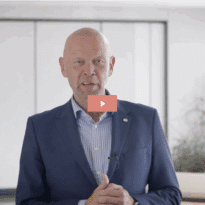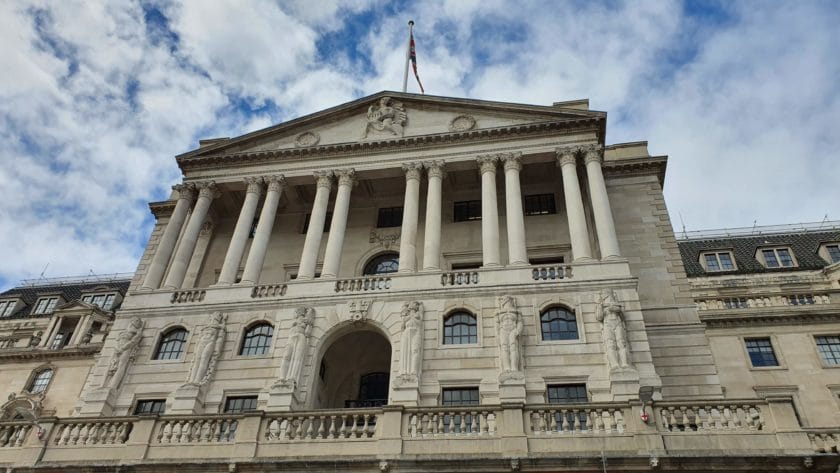The Bank of England increased rates by 75 basis points on Thursday 3 November, the highest single rise since 1989, pushing the base rate up to 3%. Here, commentators reflect on the impact on mortgages, investments, pensions and consequently, financial advice.
The Bank of England (BoE) has increased the base rate by 0.75% rate to 3% hike as the central bank tackles record high inflation. However, in doing so the Bank suggested that further increases may only be “to a peak lower than priced into financial markets” (pricing predicts around 6%).
However, the most recent inflation data release, for the month of September, was still at a 40-year high of 10.1%. Probably more troubling for the BoE was the increase of core CPI, said William Marshall, chief investment officer, Hymans Robertson Investment Services, a measure that excludes volatile items like food and energy, from 6.3% to 6.5% – also a multi-decade high.
Marshall added that with the rate of inflation still unacceptably high, the BoE is expected to continue increasing interest rates until at least next spring. “As we have seen over the past month or so, the government’s fiscal policy is now an important consideration for the BoE. The huge amount of uncertainty and U-turns on this has made an already difficult job more challenging. The BoE’s Monetary Policy Committee will hope that the new Prime Minister can bring some clarity and stability to that area.”
Mortgages
Karen Noye, mortgage expert at Quilter said that given the rate rise was anticipated by the mortgage market, she does not envisage “ too much change in the cost of the deals available as the predicted extent of future interest rises are largely already priced in.”
However, people will still be suffering with increased mortgage payments.
Borrowers who are on their lender’s standard variable (SVR) rate may see a significant jump, Noyes ai. “A good rule of thumb is that a lender’s SVR is around 2-5% higher than the Bank of England’s base rate. Therefore, now the Bank of England has raised the base rate to 3% in the best case scenario someone will be paying around 5% interest on their mortgage and potentially up to 8%, if on an SVR.
“Let’s assume that yesterday when the base rate was 2.25%, someone on their lender’s SVR was paying 4.25% interest on a £200,000 mortgage over 25 years – they would have been paying about £1,083 per month. Now the base rate has climbed to 3%, the SVR will also climb to a conservative estimate of 5%. That same mortgage at that interest rate would cost £1,169. A difference of around £86 a month.”
Anyone coming to the end of longer fixed-rate deal will be shocked by how much their monthly payments will now be in this new interest rate environment, she added. “These extra costs on top of food and energy prices rises may add up to a winter of discontent for many. This could cause a wave of people to opt to try and sell their home to opt for something smaller. If lots try and do this at the same time, the laws of supply and demand dictate that house prices will drop as stock mounts on the market but demand dries up.”
Richard Ollive, senior financial adviser at Wesleyan, said: “We can confidently imagine rates will rise further before the end of the year, heaping even more pressure on household budgets. Saying that, forecasters had been predicting that the Bank Rate could rise to 6% next year, but the Bank of England is now signalling that rates are now unlikely to exceed 5%, which will come as a relief to many. Those with savings will be well advised to investigate where they can achieve the best possible returns, including investing in Stocks & Shares ISAs.”
Investments
The Bank of England will come as no surprise to the markets, which had already priced in a 75bps hike and forecasted a peak of 4.75% in August next year, Giles Coghlan, chief market analyst, HYCM, pointed out.
“For now, at least, Rishi Sunak’s elevation to PM has instilled some sense of stability in the gilt markets and the wider economy, which has made the Bank of England’s decision easier today. This was reflected in the fact that the BoE now expects to raise interest rates to a lower peak than was previously priced into markets. This will be welcome news to UK homeowners about to renew their mortgages.
“The impact of the Energy Price Guarantee is seen by the BoE as reducing inflationary pressure to 11% for 2022 Q4 (down from August’s projections), so this will in part be why the Bank sees the need to raise rates to a lower terminal rate. The BoE sees inflation falling back early next year and back down to 2% in 2 years’ time.”
Another reason the BoE might need to do less, Coghlan said, is that the fiscal side of things will see more tightening on household budgets. “All eyes will now turn to the new prime minister’s first budget on the 17th of November as it will be the biggest factor in determining both the path of the Bank’s interest rates and the direction of the GBP.
“It is also worth noting the influence that the Federal Reserve’s meeting on Wednesday has on the GBP. With the Fed revealing that they see higher than originally thought interest rates ahead, it’s too early to call a definite peak in the USD. With this in mind, hopes of a rescue for the GBP from the US must be postponed for a little while longer, as further USD strength will continue to pressure the GBP. The latest hike is gently GBP negative from the BoE.”
Kirsty Watson, chief operating officer, adviser at abrdn, said the base rate hike will put even greater pressure on clients’ expenditure and could impact their appetite for investment. Furthermore, with the Chancellor ending universal energy support from next April and high inflation predicted to persist into next year, there is no respite in sight.
“Against this backdrop,” she said, “advisers need to be prepared to answer urgent questions and support clients with the practical support and the reassurance they need.
“Ensuring that clients continue to take a long-term view, avoiding potentially damaging short-term reactions, and maintain the right balance of investments for their financial goals will be key.”
Pensions
The BoE’s decision to hike interest rates to 3% is a stark reminder that the UK’s economic health remains fragile, said Andrew Megson, CEO of My Pension Expert.
“For pension planners, this means prolonged uncertainty for their financial future. Almost two fifths (37%) of UK adults aged 50 and over believe that the cost of living has made retirement impossible for the foreseeable future, according to My Pension Expert’s research. And whilst many will look to the Sunak-Hunt political partnership to bring a sense of calm and clarity, it is clear further challenges lie ahead.
“People are desperate for reassurance. As such, it is vital that more is done to ensure Britons have access to independent financial advice. The government must prioritise working with the financial services sector to ensure savers know where to go for advice, and how it might improve their situation. Doing so will help savers regain some financial confidence in the face of such economic volatility.”




































